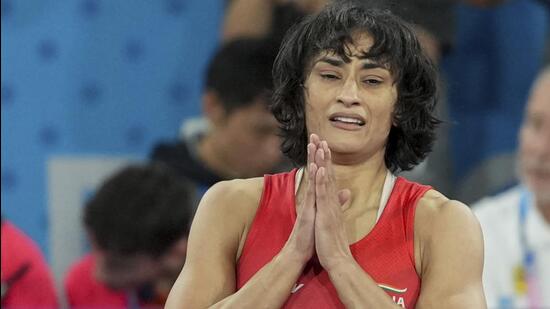
CAS arbitrator calls Vinesh’s axing draconian, but sticks to rules
7 months ago | 92 Views
New Delhi: The Court of Arbitration for Sport’s sole arbitrator who dismissed Vinesh Phogat’s appeal for a silver medal after she was disqualified for being overweight in the weigh-in before the final acknowledges that the Indian side’s arguments were persuasive, but says the clear-cut rules left no scope for any leeway.
CAS issued on Monday the detailed verdict of Annabelle Bennett, the sole Australian arbitrator who ruled on the appeal filed by India’s 50kg wrestler on August 14. In her conclusion, Bennett has said: “There is no discretion provided in the Rules, which the Sole Arbitrator is bound to apply. The Sole Arbitrator sees the force in the submissions that the consequences of failure of the second weigh-in should be restricted to ineligibility for the event that followed the second weigh-in, namely the finals, but unfortunately for the Applicant, this is not the consequence provided in the Rules.”
While calling the rule of disqualification for failing the second weigh-in harsh, the arbitrator said: “The consequences of the failed second weigh-in, which do not arise from any illegal or wrongful act on the part of the Applicant are, in the opinion of the Sole Arbitrator, draconian. A consequence of elimination without ranking from the round for which the Athlete was found ineligible, having been eligible for the rounds for which she competed, would seem to be a fairer solution.”
Vinesh, who won three bouts on August 6 to reach the final, was marginally overweight at the mandatory second weigh-in the next morning before the gold medal bout.
“There is no dispute that the Applicant failed the second weigh-in…. Her case is, in essence, that this is a small excess and can be explained by factors such as the menstrual cycle, water retention, the need to hydrate and insufficient time to reduce her weight by reason of the travel time to the Athlete’s Village.
“The problem for the Athlete is that the Rules are clear as to the weight limit and are the same for all participants. There is no tolerance provided for – it is an upper limit. It does not even allow for the weight of the singlet. It is clearly up to an athlete to ensure that they remain below that limit.”
While stating that Vinesh’s appeal for a shared silver medal was not in the power of the arbitrator, the verdict explains the world wrestling body’s (UWW) rule in this regard. “It is apparent that the Rules reflect a UWW policy that a wrestler must not only be eligible at the beginning of a competition but must also remain eligible for the whole of the competition, that is, from entry to the finals. Accordingly, there are no accumulated rights arising from partial eligibility and this explains why the Rules provide that once a wrestler is ineligible during the course of the competition, the consequences provided in Article 11 apply.”
In UWW’s rules and regulations, Article 11, pertaining to weigh-in, comes under Chapter 3 – Competition Procedure. It explains that wrestlers who are competing on the second day must be present for the weigh-in, which will be of 15 minutes. “Throughout the entire weigh-in period, wrestlers have the right, each in turn, to get on the scale as many times as they wish,” it says. “If an athlete does not attend or fail the weigh-in (the 1st or the 2nd weigh-in), he will be eliminated of the competition and ranked last, without rank….”
In her “preliminary observations” under the subhead Merits, Bennett says: “This is a particularly difficult case. The facts are not in dispute: the Applicant was above the 50kg limit for her wrestling category when she weighed-in for the finals at the Paris Olympics. Had she competed, she would have been awarded either the gold or the silver medal. Her success in the competition had led to her being in that position.”
The background facts listed in the detailed verdict mention Vinesh’s submission that she weighed 150grams over the weight limit, and on repeating the weigh-in 15 minutes later, she was 100grams over the limit. The referee overseeing the weigh-in though only recorded the failed weigh-in by marking “NO” against her name. UWW submitted at the hearing that it was standard procedure.
Vinesh’s lawyers pointed out at the hearing that only the referee’s signature, and not Vinesh’s, was on the list, but the wrestler conceded she was overweight and hence the issue was dropped.
Read Also: Samoa vs Vanuatu Highlights: Samoa beat Vanuatu by 10 runs
#




















